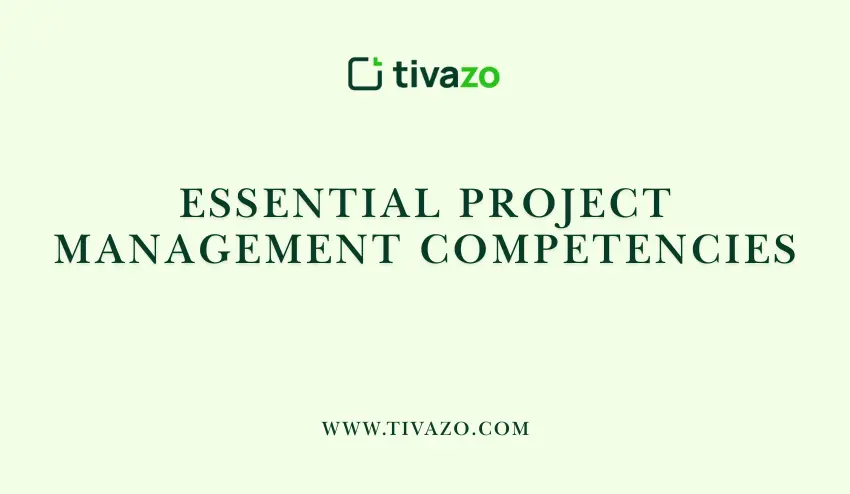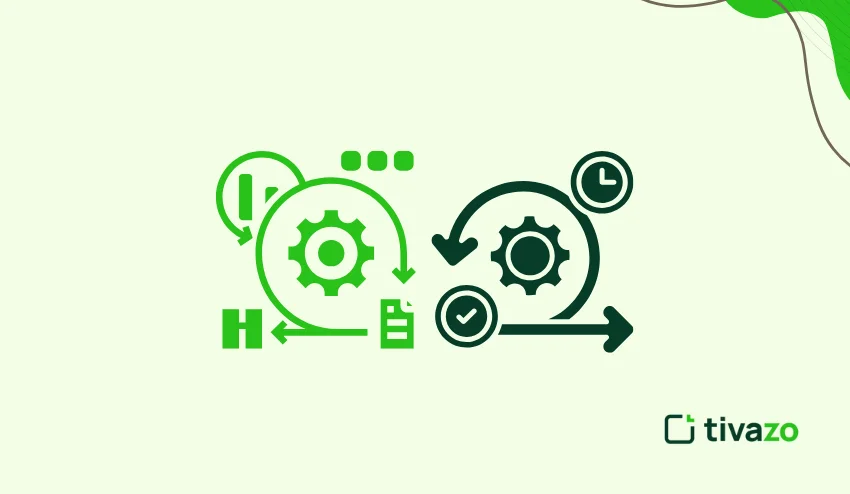Successful projects are based on project management competencies. As a manager who is in charge of a team or a freelancer who has several clients, having these competencies will be the key to doing successful projects and those that lag behind.
In the modern work environment, which is quite fast-paced, it is not enough to possess the right tools. The skills such as leadership, communication, and time management would identify how well you can plan, implement, and achieve outcomes.
This guide includes the 12 key project management competencies that any manager and freelancer must acquire. You will find out why they are important, how to enhance them and real life strategies that can be applied in real world projects.
What Are Project Management Competencies?
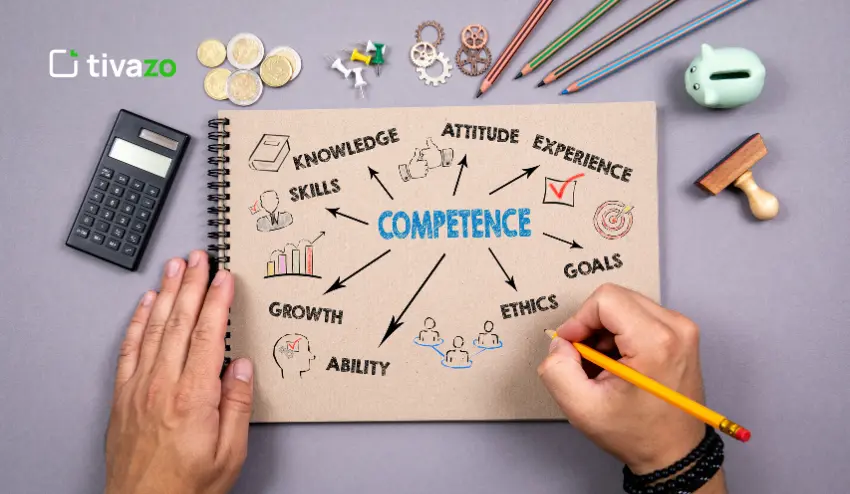
The set of skills, behaviors, and knowledge needed to plan, implement, and deliver projects successfully is known as project management competencies. Competencies, unlike simple skills, are a representation of the skills in applying knowledge in practical settings.
That is, whereas a skill such as scheduling indicates what one is capable of, a competency indicates how one works under pressure, how one handles teams and how one gets results. This is an important distinction to both managers and freelancers. A high competency will make sure that you can flex your skills to other projects, clients and team dynamics.
Key Points:
- Skills are competencies (hard and soft).
- They can be quantified and improved with time.
- They have a direct effect on the project results and customer contentment.
Why Project Management Competencies Matter for Managers & Freelancers
Project management competencies aren’t only nice to have, they are mandatory to successful project delivery whether you are managing a team or working alone.
For managers: Good competencies aid in aligning teams, defining roles and ensuring that projects are completed on time and within budget. They decrease the number of misunderstandings, enhance decision making, and increase team morale. A manager with communication and risk management expertise will be able to avoid expensive errors before they get out of hand.
For freelancers: Competencies create trust and reputation in clients. Although you may be working alone, the ability to manage time, negotiate, and communicate with the stakeholders will make sure that you get the projects done in an efficient and professional manner. The freelancers who have high competencies can work on complex projects, deal with subcontractors, and have repeat business.
Examples: A freelancer with skills in planning, communicating, and adapting will be able to grow beyond small projects to a distant design team, finishing them 30 times faster and resulting in better client retention.
Core Categories of Project Management Competencies
There are three broad categories of project management competencies namely technical, behavioral, and contextual. Knowledge of these categories assists managers and freelancers to know areas they need to work on and implement in their projects.
Technical Competencies
These are the hard skills that will be needed to plan and implement projects effectively. Examples include:
- Project planning and scheduling- making realistic schedules.
- Budgeting and cost control- management of project finances.
- Risk management- the identification, evaluation and reduction of risks.
- Quality management- delivery of quality deliverables.
Behavioral Competencies
Behavioral competencies revolve around the way you relate with others and how you react to difficulties. Key examples:
- Leadership and motivation
- Interpersonal communication among stakeholders.
- Adaptability to change
- Conflict resolution
Contextual Competencies
Contextual competencies are the knowledge of the environment and how to fit the projects into the organizational objectives. They include:
- Strategic thinking and business acumen.
- Cultural awareness
- Regulatory knowledge and compliance.
- Socially responsible and sustainability.
12 Key Project Management Competencies to Master
Learning the correct project management competencies will make sure that managers and freelancers can accomplish projects successfully, fulfill client expectations, and manage teams effectively. The 12 key competencies and their description are listed below:
1. Leadership
Being a leader means leading, inspiring, and motivating your team- or yourself in case you are a freelancer. Effective leadership implies the establishment of objectives, making hard choices, and developing responsibility. In the case of freelancers, leadership is translated into self-discipline, priorities, and coordinating with subcontractors or partners.
2. Communication
Communication is not only about email messages or meeting. It is about communicating effectively, being an active listener, and making sure that all the stakeholders are aware of project goals. By updating clients and explaining what to expect, managers will be able to avoid misunderstandings and conflicts, whereas freelancers will be able to gain the trust of their clients.
3. Time Management
Time management encompasses prioritization of tasks, resourceful allocation and meeting of deadlines. Managers have to organize the team of various team members and projects at the same time, and freelancers have to balance between several clients and deliverables. Efficiency can be increased with the help of such tools as calendars, task trackers, and Pomodoro techniques.
4. Risk Management
Risk management is the skill to project possible problems, evaluate their effect and strategize on the ways to mitigate them. To avoid project delays, managers need to detect risks at an early stage and to avoid scope creep, missed deadlines, or budget overruns, freelancers need to plan contingencies.
5. Budgeting & Cost Control
This competency makes projects viable in terms of finances. Managers monitor costs, distribute resources efficiently and make contingency plans. Freelancers have to calculate the costs of projects correctly, control the budgets of clients, and change the price or schedule in case of unexpected expenses.
6. Problem-Solving & Decision-Making
Projects are bound to experience challenges. Effective problem solving means the ability to analyze problems, investigate alternatives and execute them effectively. There is a need to weigh risks, benefits and long term consequences when making decisions. Team conflict or process bottleneck is addressed by managers, client or project related hurdle is addressed by freelancers.
7. Technical Knowledge
Technical knowledge constitutes knowledge on project management tools, methods and industry standards. Managers use such software as Asana, Jira, or Trello to manage tasks, assign duties, and oversee progress. The advantage of the freelancers is that they can arrange the work, interact with the clients, and simplify the process with the help of these tools.
8. Adaptability
Adaptability is the capability to react efficiently to a change in the scope, resources, or environment. The managers should adapt to the remote or hybrid team strategies, and the freelancers should be able to meet the changing needs of the clients or meet the deadline without affecting the quality.
9. Negotiation
Negotiation abilities assist in controlling expectations, contracts and resources. Managers bargain with the stakeholders over achievable deadlines, budgets or resources. Freelancers bargain the project scopes, rates and deadlines to ensure the satisfaction of the client and the workload themselves.
10. Stakeholder Management
Stakeholder management can be defined as the act of involving, communicating and pleasing every stakeholder of a project. Managers develop trust and client, team and executive buy-in. Freelancers have effective communication with customers, and they make sure that the expectations and deliverables are in line.
11. Team Collaboration & Emotional Intelligence
Teamwork involves learning to work in a group and creating a conducive atmosphere. Collaboration is improved by emotional intelligence self awareness, empathy and conflict resolution. Managers employ it to enhance the team performance; freelancers employ it to collaborate with clients, partners or subcontractors.
12. Business & Strategic Alignment
The competency will make sure that projects are adding to the overall business goals. Managers consider the support of initiatives to the company strategy and ROI. Freelancers match outputs of projects to the goals of the clients, therefore, deliverables are not only done but are valuable and effective.
Example: A freelancer working on a marketing campaign uses communication, time management and stakeholder management skills to complete the project on time. The client will be satisfied and the repeat business will go up. In the meantime, a manager who is in charge of a cross-functional team applies leadership, flexibility, and strategic orientation to accomplish a product launch early.
Strategies to Develop Project Management Competencies
Project management competencies are developed continuously. Structured strategies can help both managers and freelancers to enhance their abilities and better the outcomes of the projects.
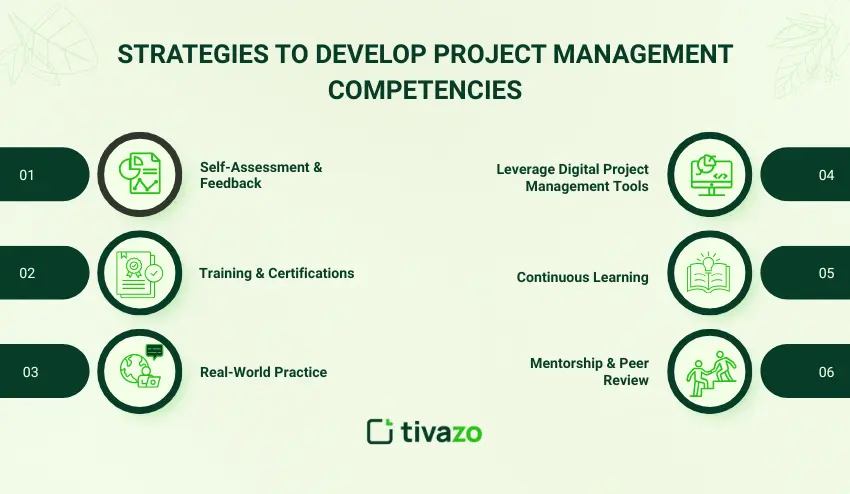
1. Self-Assessment & Feedback
Begin by determining your personal strengths and weaknesses. You should use self-assessment tools, or seek feedback from your colleagues, clients, or team members. This helps to determine areas for development and track your development over time.
2. Training & Certifications
Formal training provides organized knowledge. For example, managers may be certified professionals in their fields (such as PMP, PRINCE2, or Agile); freelancers might choose to participate in an online training program focused on a specific skill, such as risk management or leadership. Certifications require you to develop knowledge but also provide professional legitimacy.
3. Real-World Practice
Theory alone isn’t enough. Use project-based competencies on small projects. Cross-functional initiatives can be undertaken by managers, and side projects or client pilots can be used by freelancers to develop their skills.
4. Leverage Digital Project Management Tools
Trello, Asana, ClickUp and Jira are among the tools that can help you organize activities, track progress and improve teamwork. Using these tools on a regular basis leads to improvement in the technical and organizational skills of the user. Freelancers can manage multiple clients using simple dashboards.
5. Continuous Learning
Stay informed about the latest in the industry, discover innovative ways of doing things and keep current with best practice. Blogs, podcasts, webinars and project management communities will all provide managers and freelancers with a competitive edge and perspectives with regards to flexibility.
6. Mentorship & Peer Review
The steepest learning will come when working with advisers, mentors or peers. In some organizations managers will have tapped into the advice and wisdom of senior leaders and too can freelancers will access peer groups that strictly share learnings between peers with candid feedbacks to develop their competencies.
Case Study: Building Project Management Competencies in Action
The project management competencies have a practical application that can be seen in practice. Let us consider a real life case of both managers and freelancers.
Freelancer Scenario:
A medium-sized client needed a multi-channel campaign to be handled by a freelance marketing consultant. The project was first delayed because of confusion and overlapping timelines. The freelancer developed a timeline that utilized time management, communications, and stakeholder management skills to create structure, regular updates to the client, and clarification of deliverables. The result: the campaign was launched on time, engagement increased 25, and the client agreed to a follow-up project.
Manager Scenario:
A project manager who was in charge of a software development team was facing the problem of scope creep and lack of motivation in the team. Through the use of leadership, adaptability, and risk management skills, the manager rearranged the tasks, adopted agile sprints, and used weekly check-ins to deal with risks early. Result: the team was 15% faster than the project timeline predicted and the quality was better as well as the team satisfaction.
Key Takeaways:
- Competencies are converted into quantifiable outcomes.
- Continuous improvement and use are beneficial to both the managers and the freelancers.
- Formal strategies avoid time wastage, financial overruns, and misunderstandings.
Common Mistakes Managers & Freelancers Make with Project Management Competencies
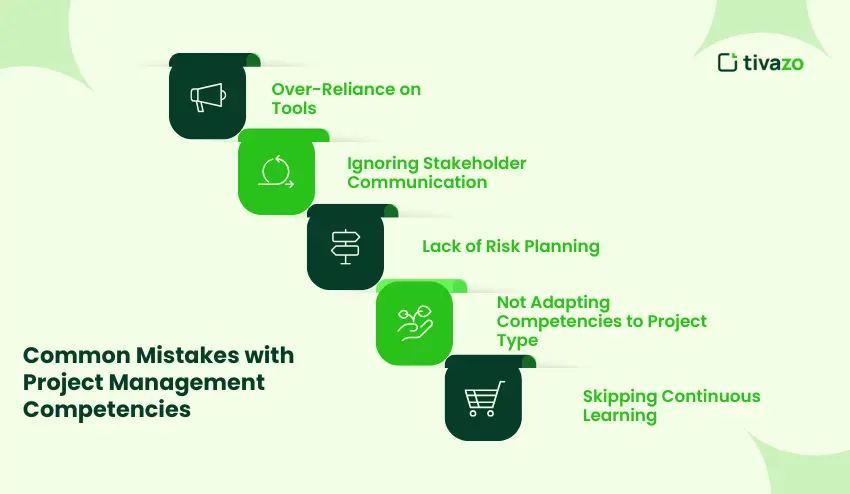
These are the most prevalent errors that managers and freelancers commit when using project management competencies.
Even the professionals who are experienced may commit errors that restrict the performance of their project management competencies. These pitfalls can be identified and prevented to guarantee improved project results to both managers and freelancers.
1. Over-Reliance on Tools
Tools are useful, but they cannot substitute such critical project management competencies as critical thinking, leadership, and communication. The reliance on software alone by professionals can make them neglect the relationship-building and strategic decision-making.
2. Ignoring Stakeholder Communication
The failure to communicate with stakeholders undermines action competencies of project management. Constant updates, feedbacks, and documentation can avoid misunderstandings, delays, and dissatisfaction.
3. Lack of Risk Planning
Risk assessment and mitigation are project management competencies that cannot be fully used without proper risk planning. Early detection and control of possible risks are used to keep the projects on schedule.
4. Not Adapting Competencies to Project Type
Project management competencies are different in different projects. Freelancers with a client campaign might require more communication and time management whereas managers with software rollouts might depend on leadership and strategic alignment.
5. Skipping Continuous Learning
The competences change with the industry trends, technology, and distant working. You can stagnate in your project management competencies by ignoring continual learning and it becomes difficult to respond to the current project requirements.
Competency Development Checklist (10 Steps)
Developing strong project management competencies requires a structured approach. Use this 10-step checklist to strengthen your skills and ensure measurable growth:
- Determine Gaps – Do a self-assessment to identify what project management competencies should be enhanced.
- Set Development Goals- Outline specific, practical goals of each competency.
- Take Online Courses- Take pertinent courses or certifications to develop technical and behavioral competencies.
- Join PM Communities -Become part of the community of other managers and freelancers to exchange experiences and knowledge.
- Side Projects Practice- Use low-risk project competencies to practice.
- Learn One New PM Tool- Learn the project management software to enhance technical skills.
- One Soft Skill at a Time – Communication, leadership, or emotional intelligence are some of the areas that are possible to improve gradually.
- Track Progress Weekly- Review your progress and modify plans accordingly.
- Seek Feedback- Consistently request the feedback of peers, mentors, or clients to develop competencies.
- Lesson Learned Document – Have a record of the challenges, success and the strategies to reinforce learning.
Conclusion
Project management competencies are critical to the success of managers and freelancers who execute projects, satisfy clients expectations, and lead people. The project manager competencies extend beyond technical capabilities; they include leadership, communication, flexibility, and strategic thought, which all contribute to the success of a project.
The investment of your time in personal development will pay off in greater efficiencies, customer relationships, and confidence that comes with working in complex projects. Whether you are leading a team or working alone, continuous application of the competencies will lead to tangible results and your ongoing professional development.
